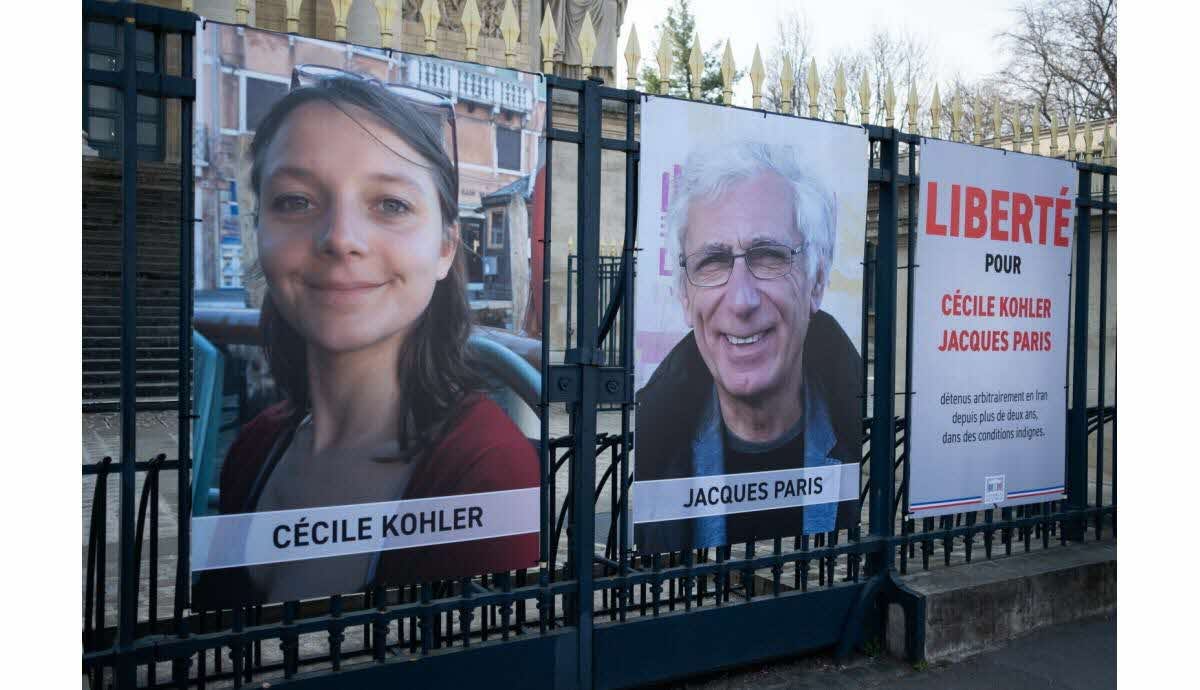Missing in Iran: France’s Young Cyclist, Forgotten Hostages, and the Islamic Republic’s Expanding Kidnap Economy
Lennart Monterlos, an 18-year-old dual French German citizen, set out with a dream—to bike across Asia and Europe, documenting his journey. That dream ended somewhere in Iran. On June 16, 2025, all communication from Lennart abruptly ceased. His last Instagram post showed him pedaling alone through the Iranian landscape. Since then, not a word.
He is now missing—unreachable, unaccounted for, and presumed detained by Khomeinist regime authorities.
The French Foreign Ministry has officially labeled the case “worrying,” urging French citizens to avoid travel to Iran under any circumstances. Behind closed doors, French diplomats know exactly what this is: yet another hostage taken by a regime that has built an entire foreign policy around kidnapping.
And it’s not the first.
In May 2022, French teacher Cécile Kohler, 40, and her partner Jacques Paris, 72, were arrested by Islamic regime authorities and accused of espionage, conspiring to overthrow the regime, and committing “corruption on Earth”—a charge that carries the death penalty.
Their ordeal has been brutal. Cécile was denied legal representation. She slept on the floor of her cell. Contact with her family was nonexistent for months. By mid-2025, they had been transferred to Tehran’s notorious Evin Prison.
But that wasn’t the end.
Following an Israeli strike on Evin in June 2025, which reportedly killed 71 people, both Kohler and Paris were moved—disappeared—into an undisclosed black site under the regime’s control. Since that transfer, no one—not even French officials—knows where they are.
The timing is no coincidence. The Islamic regime announced formal charges against Kohler and Paris just three days before Lennart Monterlos vanished. The message to the West was clear: push us, and we will snatch more of your citizens.
The Khomeinist regime’s hostage policy is not a secret. It is a system. Western nationals are detained, accused of fabricated crimes, and dangled as diplomatic bait—traded for money, prisoners, sanctions relief, or silence.
These cases are not isolated incidents. They form a pattern, part of a long-standing doctrine of hostage diplomacy that dates back to the seizure of the U.S. Embassy in 1979. And the regime has only grown bolder.
The Islamic Republic now actively targets travelers, students, academics, NGO workers—even tourists—as pawns in its geopolitical chessboard.
French authorities believe Tehran is deliberately using innocent lives to retaliate against Western diplomatic actions. In the weeks leading up to Lennart’s disappearance, France, along with Britain and Germany, warned the Islamic authorities that they might trigger the “snapback” mechanism in the JCPOA over nuclear violations. Tehran responded not with dialogue—but with a kidnapping.
French President Emmanuel Macron has been quick to condemn the Islamic regime’s actions. He’s threatened to escalate to the International Court of Justice and has warned of “retaliatory measures” if the Islamic Republic proceeds with the prosecution of Kohler and Paris.
But these threats have proven empty.
Two years after Kohler and Paris were seized, and weeks after they vanished from the prison system entirely, France has yet to secure their release—or even locate them. Now, with Monterlos also missing, Macron’s warnings ring hollow. His administration has failed to turn words into leverage.
The pattern is undeniable: the Khomeinist regime abducts, France denounces, and nothing changes.
The international community has allowed this hostage economy to flourish through inaction and appeasement. Instead of sanctions and consequences, Tehran is met with negotiations and nuclear talks. Instead of isolation, it’s granted space on global stages.
While Macron blusters from the Élysée Palace, Tehran continues to expand its hostage empire unchecked.
Three French citizens—Monterlos, Kohler, and Paris—are now either imprisoned or vanished in the Islamic Republic. France’s only response? Strongly worded statements and legal filings.
What’s happening is not diplomacy—it’s extortion. The Islamic Republic is a regime of professional hostage-takers, and the West continues to behave as though there’s a negotiating table worth sitting at.
The disappearance of Lennart Monterlos is not a mistake or a tragic accident. It is a deliberate act of state terrorism. So was the detention of Cécile Kohler and Jacques Paris. So are the hundreds of other cases involving innocent dual nationals rotting in Iranian prisons or simply gone without a trace.
It is long past time for France—and all Western democracies—to stop pretending. The Islamc regime understands one thing: power. Until there are consequences, there will be more hostages.






